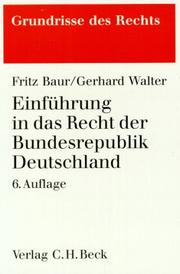| Listing 1 - 10 of 64 | << page >> |
Sort by
|
Book
ISBN: 3518022725 9783518022726 Year: 1988 Publisher: Frankfurt a. M.: Suhrkamp,
Abstract | Keywords | Export | Availability | Bookmark
 Loading...
Loading...Choose an application
- Reference Manager
- EndNote
- RefWorks (Direct export to RefWorks)
Book
ISBN: 3518375989 9783518375983 Year: 1985 Volume: 1098 Publisher: Frankfurt a. M.: Suhrkamp,
Abstract | Keywords | Export | Availability | Bookmark
 Loading...
Loading...Choose an application
- Reference Manager
- EndNote
- RefWorks (Direct export to RefWorks)
Book
ISBN: 3540081593 3642666035 Year: 1977 Publisher: Berlin Springer
Abstract | Keywords | Export | Availability | Bookmark
 Loading...
Loading...Choose an application
- Reference Manager
- EndNote
- RefWorks (Direct export to RefWorks)
Maternal-Fetal Exchange. --- Placenta --- anatomy & histology. --- Transplacental Exposure --- Exchange, Maternal-Fetal --- Exposure, Transplacental --- Maternal Fetal Exchange --- Biological Transport --- Fetus --- Maternal Exposure --- Placental Circulation --- Maternal-Fetal Relations --- Maternal-Fetal Exchange --- anatomy & histology
Book
ISBN: 320598451X Year: 1998 Publisher: Wien Böhlau
Abstract | Keywords | Export | Availability | Bookmark
 Loading...
Loading...Choose an application
- Reference Manager
- EndNote
- RefWorks (Direct export to RefWorks)
Austrian literature --- Literature and state --- National socialism and literature --- Literature and national socialism --- Literature --- State and literature --- Authors and patrons --- Cultural policy --- History and criticism
Book
Year: 1973 Publisher: München Fink
Abstract | Keywords | Export | Availability | Bookmark
 Loading...
Loading...Choose an application
- Reference Manager
- EndNote
- RefWorks (Direct export to RefWorks)
Book
ISBN: 0520061071 Year: 1988 Publisher: Berkeley University of California Press
Abstract | Keywords | Export | Availability | Bookmark
 Loading...
Loading...Choose an application
- Reference Manager
- EndNote
- RefWorks (Direct export to RefWorks)
Book
ISBN: 3778066617 Year: 1981 Publisher: Schorndorf Hofmann
Abstract | Keywords | Export | Availability | Bookmark
 Loading...
Loading...Choose an application
- Reference Manager
- EndNote
- RefWorks (Direct export to RefWorks)
Multi
ISBN: 9789400722545 Year: 2012 Publisher: Dordrecht Springer Netherlands
Abstract | Keywords | Export | Availability | Bookmark
 Loading...
Loading...Choose an application
- Reference Manager
- EndNote
- RefWorks (Direct export to RefWorks)
The interaction between corporations and non-governmental organizations (NGOs) has become an important topic in the debate about corporate social responsibility (CSR). Yet, unlike the vast majority of academic work on this topic, this book explicitly focuses on clarifying the role of NGOs, not of corporations, in this context. Based on the notion of NGOs as political actors it argues that NGOs suffer from a multiple legitimacy deficit: they are representatives of civil society without being elected; the legitimacy of the claims they raise is often controversial; and there are often doubts regarding the legitimacy of the behaviour they exhibit in putting forward their claims. Set against an extended sphere of political action in the postnational constellation this book argues that the political model of deliberative democracy provides a meaningful conceptualization of NGOs as legitimate partners of corporations and it develops a conceptual framework that specifically allows distinguishing legitimate partner NGOs from two related actor types with whom they share certain characteristics but who differ with respect to their legitimacy. These related actor types are interest groups on the one hand and activists on the other hand. In conclusion it argues that a focus on the behaviour of NGOs is most meaningful for distinguishing them from interest groups and activists.
Philosophy --- Political philosophy. Social philosophy --- General ethics --- Politics --- Economics --- politieke wetenschappen --- economie --- ethiek --- filosofie

Abstract | Keywords | Export | Availability | Bookmark
 Loading...
Loading...Choose an application
- Reference Manager
- EndNote
- RefWorks (Direct export to RefWorks)

ISBN: 1282008552 9786612008559 1442675675 9781442675674 9781282008557 0802009271 9780802009272 1442614897 Year: 1998 Publisher: Toronto
Abstract | Keywords | Export | Availability | Bookmark
 Loading...
Loading...Choose an application
- Reference Manager
- EndNote
- RefWorks (Direct export to RefWorks)
"Georg Wilhelm Friedrich Hegel (1770-1831) is considered a philosopher of the Tradition, both in the sense that his work is rooted in the political, artistic, religious, and philosophical traditions of European culture and in the sense that he takes up the notion of tradition as an object of philosophical investigation. This collection examines Hegel's philosophy as it bears on the meaning and relevance of tradition - historical, legal, aesthetic, religious, and philosophical. The thirteen original essays draw upon and celebrate the work of H.S. Harris, who is considered by many to be the most influential interpreter of Hegel in the English-speaking world."--Jacket.
PHILOSOPHY / Criticism. --- Hegel, Georg Wilhelm Friedrich, --- Hegel, Giorgio Guglielmo Frederico --- Hegel, Georg Wilhelm Friedrich --- Hēgeru, --- Hei-ko-erh, --- Gegelʹ, Georg, --- Hījil, --- Khegel, --- Hegel, G. W. F. --- Hegel, --- Hei Ge Er, --- Chenkel, --- Hīghil, --- הגל, --- הגל, גאורג וילהלם פרידריך, --- הגל, גיאורג וילהלם פרידריך, --- הגל, ג.ו.פ, --- היגל, גורג ווילהלם פרדריך, --- היגל, גיורג וילהלם פרידריך, --- 黑格尔, --- Hegel, Guillermo Federico, --- Hegel, Jorge Guillermo Federico, --- Heyel, Georg Wilhelm Friedrich, --- Higil, Gʼūrg Vīlhim Frīdrīsh, --- هگل, --- هگل، گئورگ ويلهم فريدريش,
| Listing 1 - 10 of 64 | << page >> |
Sort by
|

 Search
Search Feedback
Feedback About UniCat
About UniCat  Help
Help News
News